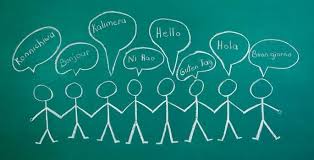"Words and the World"

Chapter one offers us an introduction to how language shapes our identities and our world around us.
"A language is more than just words and grammar. It's also a way of viewing the world, maintaining a culture, and expressing your connections to others. Because your language is so closely tied to who you are, changing your language is like shifting your identity" (6).
Critical Thinking:
What is the connection between language and identity?
What kinds of information does it expose about you?

How can language can disclose your...
1. Nationality and Culture?

Example: British vs. American Word Choice and spelling
http://www.buzzfeed.com/erinchack/words-that-mean-something-completely-different-in-the-uk
Canadian Accent/Word Choice
https://www.youtube.com/watch?v=O9luUcCPZjY
2. Age?
3. Gender?
4. Education?
5. Socio-Economic Class?
6. Profession?
On page 6, the text provides the example of Robert, a bilingual college student.
-Read with class
Thinking about this experience in your life:
- How do you change your language/identity on a daily basis?
- What slang or jargon do you encounter?
- How do academic situations play a role in these language/identity changes? (general and specific situations)
pg. 11-12: Speaking vs. Writing
What is the difference?
What is more formal?
Diction:
refers to the choice and use of words
different audiences and situations call for different levels of diction
pages 190-191 in Handbook
The difference between Formal Diction and Informal Diction
Read page 192: College Writing
Language Change: pages 7-8
The points that the English language has substantially changed throughout history and that it continues to do so are not new ideas; however, we may not be as familiar with the arguments connected to this process.
We may not initially question why or how language has changed, and the text begins to put this into prospective.
What are some of the reasons that language has changed?

An Analytical Example: The frequency of the words that we use has also changed
Why might that be?
Patricia Greenfield, author of the study and professor of psychology at UCLA, analyzed words used in over 1.5 million American and British books published between 1800 and 2000, and believes language shows how cultural values have developed and changed over 200 years.
Greenfield’s theoretical interest lies in the connection between culture and human development, according to her faculty biography.
In her study, she noted that words like “get,” “choose,” “feel,” and “individual” were used more frequently as the years went on. These words have more to do with materialism and the individualistic values that became more prevalent in the modern age, she noted.
"This research shows that there has been a two-century–long historical shift toward individualistic psychological functioning adapted to an urban environment and away from psychological functioning adapted to a rural environment," Greenfield said.
The use of words like “obliged,” “give,” “obedience,” and “pray” has decreased, the study notes, suggesting that the once-important values of obedience to authority and religion in everyday life have diminished. Frequency of the use of words like "act," "belong," and "authority" has also waned, in comparison to that of "child" and "unique," which has increased.
Comments (0)
You don't have permission to comment on this page.